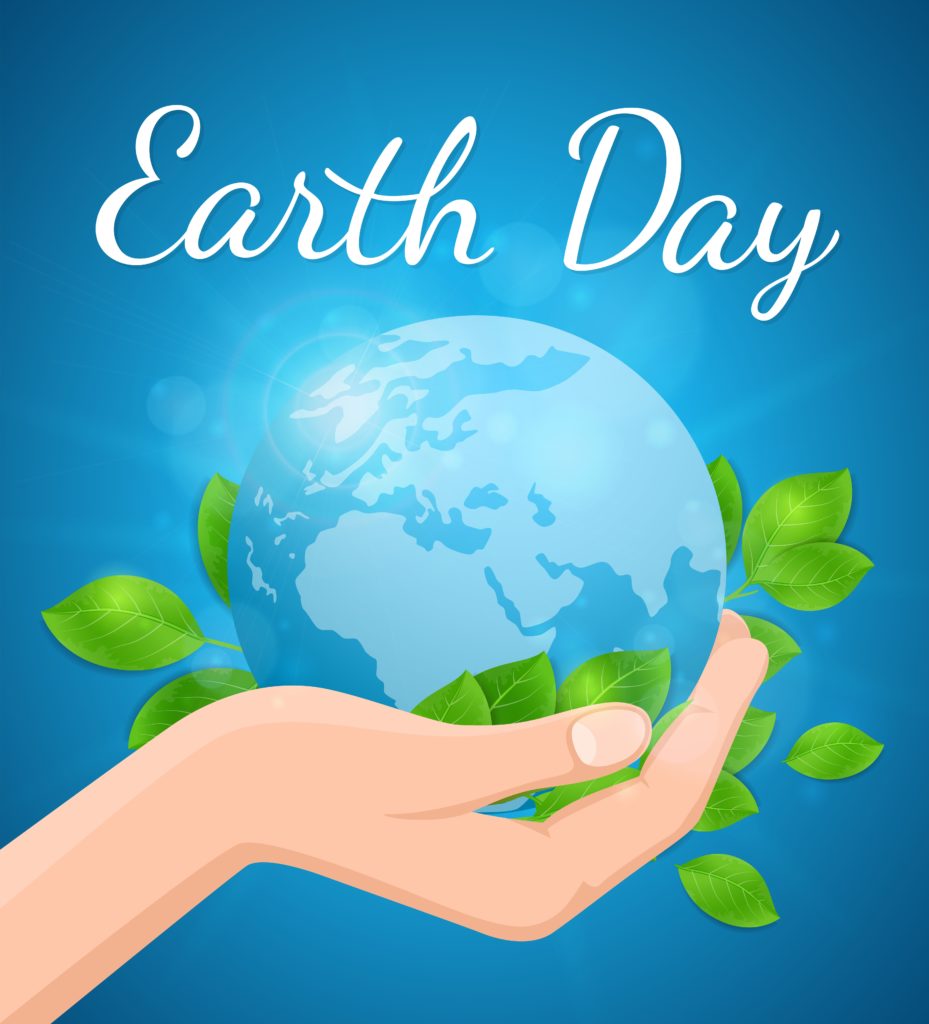
It’s Earth Day, and that means it’s time to think about ways we can reduce our impact on the environment. At Healthy Ponds, we are focused on helping customers find natural pond maintenance solutions every day of the year, but we also want to share some information that can help make your whole life more eco-friendly. So, let’s celebrate Earth Day by finding ways to live a greener life!
8 Easy Ways To Go Green
1 – Recycle
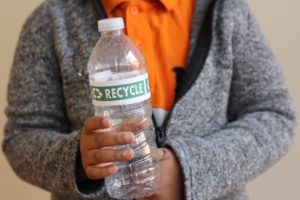
We all know that we are supposed to recycle, but many people don’t know that much about recycling or even what materials can be recycled. For instance, plastic bags, plastic wrap, and flexible plastic packaging cannot be recycled in your curbside recycling bin. Clean, rigid plastic materials usually are accepted in these bins. This includes plastic water bottles, milk bottles, and plastic tubs that hold items such as butter, sour cream, and yogurt.
In general, the two most easily recycled plastic materials are polyethylene terephthalate (PET) and high-density polyethylene (HDPE). You probably have noticed that many plastic items have numbers inside the recycling symbol that resembles a circle of arrows. These numbers are resin identification codes, and PET has a code of 1, while HDPE is 2. These two materials are accepted by virtually all curbside recycling programs in the United States.
Many paper items can and should be recycled. This includes magazines, newspapers, copy paper, clean cardboard, and clean cardboard food containers. Glass bottles and containers also usually can be recycled. Tin, aluminum, and steel cans and containers also can be recycled. Of course, every curbside program is unique, so if you aren’t certain what materials are accepted in your area, visit your waste management company’s website as this should provide the exact information.
2 – Reduce & Reuse
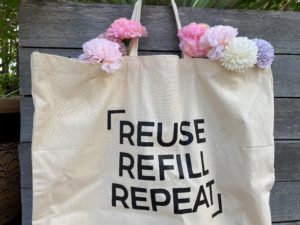
While many items can be recycled, reducing your use of plastics and other materials can be a great way to help the planet. For instance, instead of using plastic water bottles, opt for a reusable water bottle. Rather than drinking out of disposable coffee cups, purchase a reusable coffee flask.
When you go shopping, bring your own bags to reduce the need for plastic bags or even paper bags. Instead of storing food items in plastic baggies or wrapping foods in plastic wrap, use storage containers that can be reused again and again.
You can reduce paper use, as well. Switch to paperless billing and pay your bills using an online banking system. When you are out shopping, opt for digital receipts rather than paper copies.
Instead of buying new furnishings and clothing, make a commitment to purchase second-hand items. Not only will you be reducing and reusing, but you also will save money buying clothing, furnishings, and other household items from thrift stores, garage sales, and other secondhand sources.
3 – Limit Food Waste

Food waste is a huge problem around the world, but there are some easy ways to reduce the amount of food you throw away. Meal planning, for instance, can ensure that you purchase just the foods you need to create your weekly meals. Create a shopping list and stick to it carefully, avoiding impulse buys.
Don’t forget about using your freezer. Items such as herbs, butter, bacon, ham, bread, fruits, and vegetables all can be frozen for future use. For instance, if you have some strawberries or bananas that are about to go bad, freeze them and then use them in a smoothie. Not only can these tips help you reduce food waste, but it also saves money. Remember that every time you toss out food, you aren’t just wasting food, you also waste money.
4 – Compost
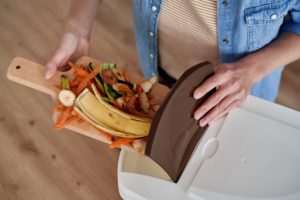
If you do have food waste, rather than tossing it into your regular trash bin, consider composting it. Many items can be placed into a household composting bin and the resulting compost can be used in your garden as well as flower beds or to condition your soil.
Items that can be composted include just about all fruits and vegetables, coffee grounds, clean cardboard, eggshells, houseplants and trimmings from around your yard, leaves, and even grass clippings if you don’t use chemical pesticides. In some cases, these items can be placed into your curbside green waste bin but be sure to check with your waste management provider to ensure that you aren’t putting the wrong items in the bin.
5 – Conserve Energy
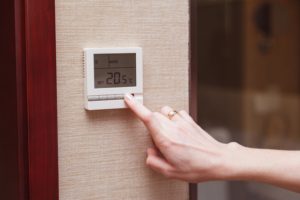
Conserving energy is easier than you think. Simply turning off the lights when you leave the room can help reduce energy use. Unplug your cell phone and laptop chargers when they aren’t in use, as well as your coffee maker and microwave. Unplug your computers at night, as well as printers or fax machines. When you head out of town, unplug your TV, cable box, DVD players, and other electronic items. You also can use power strips for many of these items, and simply turn the power strips off at night or when you leave town.
Installing LED lights reduces energy use, as well as installing a programmable thermostat. These thermostats make it easy to reduce your energy and many are connected to apps that you can use from just about anywhere. If you left your air conditioner or heater running and you aren’t home, you can use the app to either turn it off or adjust the temperature.
Closing drapes or curtains on hot days can help your air conditioner work more efficiently. Close the vents in rooms you don’t use so that you don’t waste energy heating or cooling these spaces. All of these tips conserve energy, but they also will save you some money, so there’s no downside to conserving energy.
6 – Conserve Water
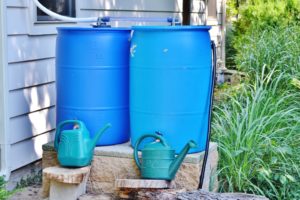
At Healthy Ponds, we are committed to improving water quality through the use of our natural pond maintenance products, but we also understand the importance of water conservation, especially in drought-prone regions of the country. Fortunately, there are many easy ways to reduce your water use.
For instance, shorten your showering time. Set a time and allow yourself just three or four minutes to get clean. We also recommend placing a bucket in your shower to catch the excess water, especially the water that is wasted while you wait for the shower to heat up. This excess water can be used to water house plants or outdoor plants. Turning off the water while you brush your teeth and shave are two other easy ways to conserve water.
Did you know that a typical dishwasher uses about 25 gallons per cycle and a washing machine might use more than 30 gallons? To save water, don’t run a load of laundry or a dishwasher load unless these machines are full. We also recommend that you check for leaky faucets and toilets as these are huge water wasters.
Install rain barrels in your yard to catch some of the runoff from the rain. While we focus on pond maintenance products, we also have a natural rain barrel cleaner that’s easy to use and will ensure that the water in your rain barrel doesn’t become stagnant.
Replace some (or all) of the plants in your yard with drought-tolerant plants. When you do water plants or grass, consider watering during the cooler early morning hours and turn off sprinklers when there is rain in the forecast. Adding mulch in your flower beds and around trees in your yard also helps prevent evaporation.
7 – Change Your Diet
What you eat definitely makes an impact on the planet. For instance, if you buy your fruits and veggies at the local farmers’ market instead of the grocery store, this reduces the amount of fossil fuels needed to transport your food. Shopping local, as they say, is a great way to conserve energy and, at the same time, support local businesses and farmers.
Opting for a more vegetarian or vegan diet also helps the planet. No matter what foods you eat, energy and water are needed to produce those foods. For instance, it takes more than 200 gallons of water to create just one loaf of bread. On the other hand, to produce one pound of pork, more than 700 gallons of water are needed.
Reducing your meat consumption can help to conserve water, but that’s not the only reason to consider eating less meat, poultry, and fish. Livestock produce greenhouse gases and waste from livestock is a huge contributor to water pollution.
Even just opting for a vegetarian or vegan diet a few days a week can help the planet, so consider taking part in those Meatless Mondays and consider buying meat, eggs, and dairy products from companies committed to reducing their impact on the environment, as well as treating animals as humanely as possible.
8 – Curb Those Chemicals
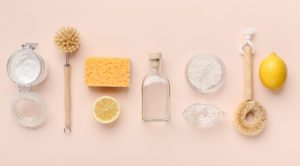
We all have cupboards stuffed with chemical-laden cleaners, but many natural products clean just as well as these harsh chemicals. Vinegar and water, for instance, can be used to clean many surfaces in your home and vinegar can be used in place of fabric softener. Baking soda also can be used to clean stainless steel, tile, grout, toilets, and much more. Vinegar and baking soda are natural, safe, and inexpensive.
Obviously, during the global pandemic, we need to keep a few disinfectants on hand, but for many general cleaning tasks, natural cleaners are a better, eco-friendly option. There are several companies these days that sell eco-friendly laundry detergent and dishwasher detergents that not only are safer for the environment, they also are packaged in non-plastic, compostable packaging. Opting for these types of products also can be a great option for families committed to living a greener lifestyle.
These are just a few ways to go green and help keep our planet as healthy as possible. Of course, if your property has a pond, we have a few additional suggestions that can help keep your water balanced and healthy.
Natural Pond Maintenance
Many factors contribute to pond water quality issues. For instance, temperature spikes and excessive rainfall can disturb the balance in your pond ecosystem. Runoff from lawns treated with certain pesticides can cause the rapid growth of floating organic matter. Grass clippings, leaves, animal waste and other debris can accumulate at the bottom of the pond, creating a sludge layer that reduces oxygen levels in pond water. An overgrowth of pond weeds also can cause pond water issues.
Using nitrogen-free pesticides can help and buffering the edge of your pond with beneficial plants can help reduce water runoff. We also recommend that you collect grass clippings and leaves and either store them in compost bins or transport them to a green waste facility to keep them out of your pond.
If your pond is stocked with fish, keep an eye on the fish population. In an overstocked pond, fish must compete for oxygen and accumulated fish waste adds to the sludge layer, which also reduces oxygen levels. This can lead to fish kills and the rapid growth of floating green organic matter.
Adding Healthy Ponds’ AquaSpherePRO® to your pond every 30 days can prevent many common pond issues. This pond maintenance product contains a mix of beneficial bacteria that consume excess nutrients in pond water. This chemical-free treatment is also easy to use. You simply toss the biodegradable spheres into the pond and they begin releasing beneficial bacteria.
If your pond water is already stagnant or covered with floating green organic matter, Healthy Ponds also offers supplements that can be used in conjunction with AquaSpherePRO®. Natural Blast® and Rush® also contain beneficial bacteria and can be used to help mitigate many common pond issues. All of these products are chemical-free, veterinarian-approved, and safe for fish, wildlife, pets, and people.
If you aren’t sure which pond maintenance products are the best fit for your situation, we offer free personalized treatment plans for any size water feature at https://healthyponds.com/free-pond-plan/. If you have any questions about treatment or our pond maintenance products, please don’t hesitate to contact us at any time.


Thanks for the tips, Aside from the suggestions of the contractor of pond maintenance near me who also set up my pond, https://purelyponds.com/maintenance/ I’m doing some more research on how to keep my pond thriving with proper vegetation to keep it fresh and also to keep the fish happy too!